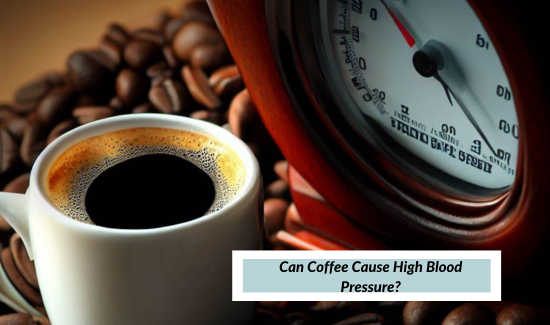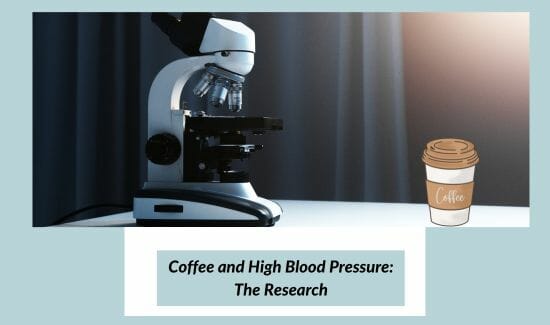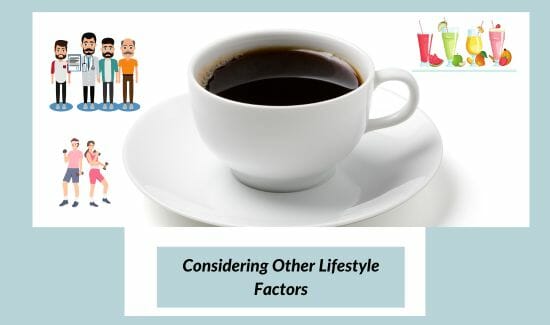
When it comes to health and wellness, coffee is often the subject of discussion. Coffee is an important part of many people’s daily lives. It is loved for its strong smell and ability to wake people up. But it has also been linked to a number of health problems, such as high blood pressure. This article aims to shed light on the question: Can coffee cause high blood pressure?

The Science Behind Coffee
Caffeine and Its Effects on the Body
Caffeine is the most well-known compound in coffee, appreciated for its ability to fend off fatigue and enhance focus. This potent stimulant works by blocking adenosine receptors in the brain, thereby increasing alertness. However, caffeine can also cause a temporary spike in heart rate and blood pressure, which is generally not a concern for most healthy adults.
Coffee and Antioxidants
But coffee isn’t just about caffeine. It’s also rich in antioxidants, which combat harmful free radicals in the body and reduce inflammation. Some research suggests that these antioxidants may have a beneficial effect on blood pressure and overall heart health.

Coffee and High Blood Pressure: The Research
Short-term Effects of Coffee on Blood Pressure
Multiple studies have demonstrated that persons who do not usually drink caffeine are more likely to experience an unexpected rise in their blood pressure when they consume caffeine. The capacity of caffeine to inhibit a hormone that maintains arteries wide open is assumed to be the cause of this rise in blood pressure.
Long-term Effects of Coffee on Blood Pressure
In contrast to its short-term effects, long-term coffee consumption doesn’t seem to increase the risk of high blood pressure or heart disease in most people, according to a number of large-scale studies. In fact, habitual coffee drinkers may develop a tolerance to the blood pressure-raising effects of caffeine. However, it’s important to remember that everyone’s body responds differently to caffeine.

Considering Other Lifestyle Factors
Diet and Exercise
While coffee consumption can have a temporary effect on blood pressure, it’s crucial to consider the impact of other lifestyle factors. A healthy diet rich in fruits, vegetables, whole grains, lean proteins, and low-fat dairy products can help manage blood pressure. Regular physical activity also plays a vital role in maintaining healthy blood pressure.
Stress and Sleep
Stress can have a significant impact on blood pressure. Finding healthy ways to manage stress, such as meditation, yoga, or simply taking time for relaxation can be beneficial. Similarly, getting enough quality sleep is crucial for overall health and can influence blood pressure.

Who Should Be Cautious?
People with Hypertension
Individuals who have already been diagnosed with hypertension should be cautious with their caffeine intake. Though the long-term effects of coffee on blood pressure are still somewhat unclear, it’s wise for those with existing high blood pressure to discuss their coffee consumption with a healthcare professional.
Pregnant Women and Older Adults
Pregnant women, older adults, and individuals with certain medical conditions should also exercise caution. Caffeine can affect not only blood pressure but also other aspects of health, such as sleep quality and bone health.
Adopting a Balanced Approach
The secret to reaping the benefits of coffee while maintaining good health hinges on balance. It’s generally accepted that one or two cups a day won’t pose a health risk. However, excessive indulgence could lead to some undesirable health conditions such as insomnia, heightened anxiety, and even elevated blood pressure.
Opting for Decaffeinated Coffee
If the caffeine content of coffee concerns you, consider switching to its decaffeinated counterpart. It ensures you still get to savor the richness and aromatic experience of coffee without the stimulating effects of caffeine.
Conclusion
In conclusion, while coffee can cause a temporary increase in blood pressure, moderate consumption is generally not associated with an increased risk of high blood pressure or cardiovascular disease in the long term. It’s important to note that individual responses to caffeine can vary, and those with hypertension or other health conditions should consult with a healthcare provider regarding their coffee intake. As always, maintaining a balanced diet, getting regular exercise, managing stress, and ensuring adequate sleep is critical for overall health and well-being.
Frequently Asked Questions
Does decaffeinated coffee raise blood pressure?
Decaffeinated coffee is unlikely to cause a significant increase in blood pressure. However, it’s always best to consult with a healthcare provider if you have concerns about your blood pressure.
How much coffee is safe to drink each day?
Moderate coffee consumption, defined as 3-4 cups per day, has been associated with several health benefits. However, individual tolerance to caffeine can vary.
Can I develop a tolerance to the blood pressure-raising effects of caffeine? Regular coffee drinkers may develop a tolerance to some of the effects of caffeine, including its impact on blood pressure. However, more research is needed in this area.
Is it safe to drink coffee if I have hypertension?
If you have hypertension, it’s a good idea to discuss your coffee and caffeine consumption with a healthcare provider.
What other lifestyle factors can influence blood pressure?
Diet, physical activity, alcohol and tobacco use, stress, and sleep can all influence blood pressure. A balanced lifestyle is key to managing blood pressure and overall health.

As a dedicated blogger, I share insights, tips, and knowledge on all things caffeinated and beyond. I firmly believe that a well-brewed cup of coffee or a skillfully crafted cocktail has the power to unite people and ignite engaging conversations.


